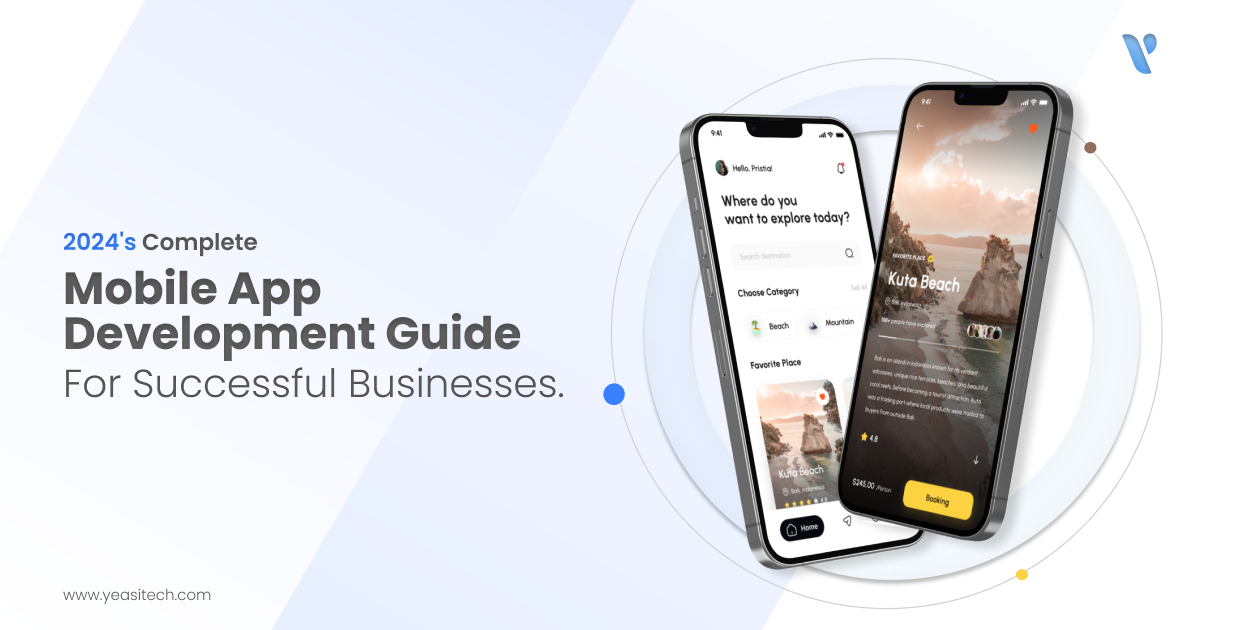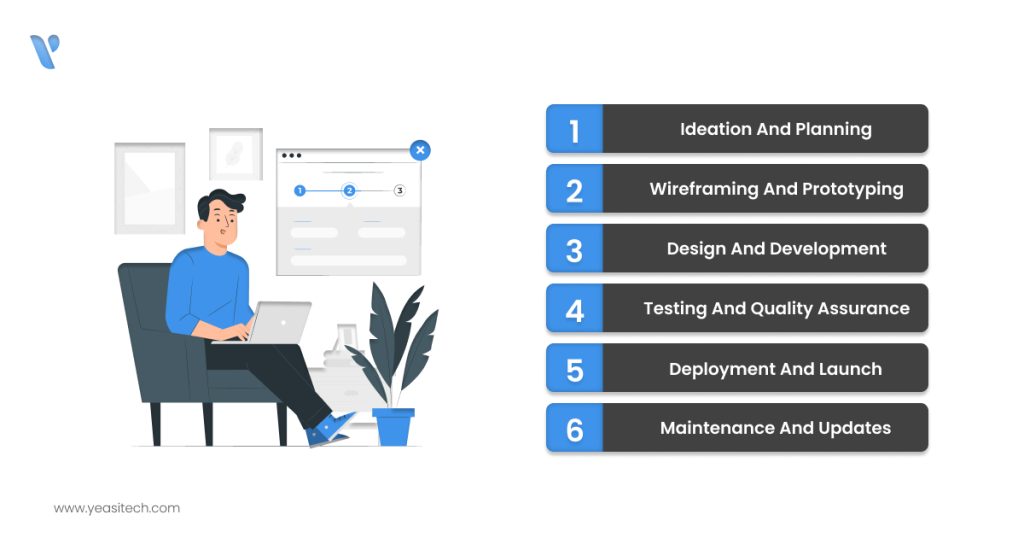2025’s Complete Mobile App Development Guide for Successful Businesses

The mobile application development market is swiftly expanding, making it an enticing venture for companies and entrepreneurs in today’s digitally evolving landscape. Investing in a mobile app development guide can be particularly rewarding as it equips business owners with the necessary insights and strategies to navigate this dynamic field.
In the third quarter of 2021, mobile users downloaded over 27.8 billion programs from Google Play, according to Statista. The Apple App Store, on the other hand, has almost 8.3 billion downloads. These figures show how the mobile app market has grown remarkably in both popularity and development.
We will discuss the advantages of mobile application development for entrepreneurs and business owners as well as the various funding options in this blog article. Now let’s get going!
Mobile app development is the process of creating apps for smartphones. These apps could be pre-installed on the phone, or you might download them from the app store or using a mobile web browser. A network connection is frequently necessary for a mobile app to communicate with remote servers.
Mobile app development offers a business a number of benefits, some of which are listed below:
A comprehensive mobile app development guide can be a beneficial resource for businesses, contributing to increased awareness, better client interaction, and extra earnings.
There are many different kinds of mobile app development, and each is made to address a particular need. They are customized to meet the particular requirements of businesses. These apps are divided into many groups, each with a distinct function. They increase customer service and productivity.
These categories are as follows:
| Types of Business | Examples |
| Customer Relationship Management (CRM) Apps | Salesforce, HubSpot , Zoho CRM, Microsoft Dynamics 365 |
| Sales and Marketing Apps | HubSpot Marketing Hub, Marketo |
| Project Management Apps | Teamwork, Trello, ClickUp , Smartsheet |
| Productivity Apps | Google Workspace, Microsoft 365, WordPress |
| Enterprise Resource Planning (ERP) Apps | NetSuite ERP, Microsoft Dynamics 365, Oracle ERP Cloud |
| E-commerce Apps | Shopify, Magento, Amazon, eBay |
| Internal Communication Apps | Microsoft Teams, Slack, Basecamp |
Developing a mobile app from scratch up is a challenging process that need for careful planning, accurate execution, and strong teamwork. The main phases in developing a customized business app are briefly described here:

In the ideation and planning phase, you set the stage for your app’s success by defining its purpose, audience, features, and goals. Comprehensive market research and competitive analysis are essential to make your app stand out.
The next important phase after initial planning is to create graphic forms for your application. In order to visualize the appearance and functionality of the app, get user input, and make any modifications before moving forward, wireframes and prototypes are important.
The design and development phase starts once wireframes and prototypes are accepted. This phase involves intricate work, including creating icons and visuals, coding the functionality of the app, and connecting databases, APIs, and third-party services.
Testing and quality assurance are vital in app development. Before release, thorough testing ensures the app works correctly, meets quality standards, and performs smoothly, including beta testing, user acceptance, and performance checks.
The app has been thoroughly tested and adjusted, and is now ready for deployment. Depending on your distribution plan and target audience, start by launching it on app stores like Google Play or the Apple App Store. You may also want to explore distributing it through business networks.
After a successful launch, maintaining functionality, security, and the most recent features of the app is done through regular updates, maintenance, and bug patches. Updates that include the newest technology improve user experience and performance.
The changing landscape of mobile applications is a result of both technological advances and changing user tastes. It’s essential for companies looking to stay ahead of the curve to keep up with the latest developments in mobile application development. Here are some major trends to keep an eye on:
The development of mobile apps has become reliant on AI/ML. The use of AI and ML in mobile app development has become important. With capabilities like customized recommendations, predictive text, and chatbots for smart customer support, these technologies increase the functionality of apps. AI may be used to make apps smarter and more responsive, which would increase user satisfaction and engagement.
AR and VR have altered user experiences across several industries, such as retail and healthcare. While VR creates completely immersive virtual environments, AR allows digital data to be imposed on the actual world. Businesses may come up with creative methods to communicate with consumers, offer virtual try-ons, or conduct interactive training sessions by combining AR and VR.
By integrating different devices, the Internet of Things (IoT) enables data sharing and communication between them. Improved features, including remote management of smart home appliances or real-time tracking of fitness data, can be provided through mobile applications that interface with IoT devices. Businesses should investigate how their apps may interact with other connected devices to deliver extra benefits as the use of IoT grows.
Due to increasing concerns about data privacy and cyberthreats, security remains the primary priority. For current mobile apps, robust security features like biometric authentication, encryption, and secure data storage are essential. To protect client data and promote confidence, businesses need to put a high priority on integrating latest security measures.
The best aspects of both internet and mobile applications are combined in PWAs to provide a seamless experience across a variety of platforms and devices. They are designed with offline functionality, quick loading times, and a user interface similar to native programs in mind. Without seeking to develop separate applications for different platforms, PWAs may be an inexpensive means for businesses to reach a wider audience.
Mobile app development may be an exciting experience, there are some dangers to be aware of. By avoiding these errors, you may increase the probability that your app will succeed and save time and money.
One of the main causes of app failure is that your app is unlikely to be downloaded if it does not reach its intended audience. To increase user interaction, retention, and installation rates—as well as to assess competitors—it is imperative to have a deep understanding of the target market, trends, and use statistics.
Because the user interface (UI) creates the first impression and is essential for user retention, don’t compromise on it while designing an app. Starting with an app flowchart, focusing on high resolutions, reducing intro animations, using engaging loading animations, and taking into account a gesture-based interface are some important design pointers.
Costs associated with developing mobile apps range from manufacturing to outsourcing and post-deployment. A good monetization mechanism (such as adverts, in-app sales, or subscriptions) must be chosen in order to generate revenue and pay for these costs over time.
Excessive feature additions might slow down and complexity your program, which can negatively impact user experience. Rather, concentrate on a small number of essential focused features to maintain the app’s usability and effectiveness.
With an MVP, you can test your product in real-world scenarios, get user feedback, and optimize your app’s performance, all while reducing expenses and development time. To improve your app and increase its chances of success, you must build an MVP.
To sum up, mobile app development is an effective tool for businesses trying to increase revenue, improve operational effectiveness, and engage customers. Businesses may design efficient apps that meet their goals by knowing the many kinds of business apps, the development process, and current trends. But it’s essential to stay away from typical mistakes like feature overload, bad targeting, and poor user interface design. Properly thought out and implemented, a well-designed mobile application can provide substantial advantages and drive company expansion.
Mobile app development involves creating applications for mobile devices. It’s crucial for businesses because it enhances customer interaction, improves brand presence, and facilitates higher sales and customer loyalty through personalized experiences and direct communication.
Key trends include the integration of AI and machine learning for personalized user experiences, the use of augmented reality (AR) and virtual reality (VR) to enhance user interaction, IoT integration for smarter app functionalities, advanced security protocols to protect user data, and the development of Progressive Web Apps (PWAs) for broader accessibility.
Business mobile apps vary widely to cater to specific operational needs. Common types include CRM apps like Salesforce, sales and marketing apps like HubSpot, project management apps like Trello, productivity apps like Microsoft 365, and ERP apps like Oracle ERP Cloud.
The process includes ideation and planning, wireframing and prototyping, design and development, testing and quality assurance, deployment and launch, followed by ongoing maintenance and updates to ensure the app remains current and functional.
Businesses should avoid poor targeting, building an unappealing user interface, lacking a clear monetization strategy, adding too many features, and neglecting the development of a Minimum Viable Product (MVP). These errors can detract from user experience and app success.
YeasiTech is a trusted IT service partner with 8+ years of experience, empowering 250+ businesses with scalable web, mobile and AI solutions.
Explore related topics to broaden your understanding and gain actionable insights that can transform your strategies.